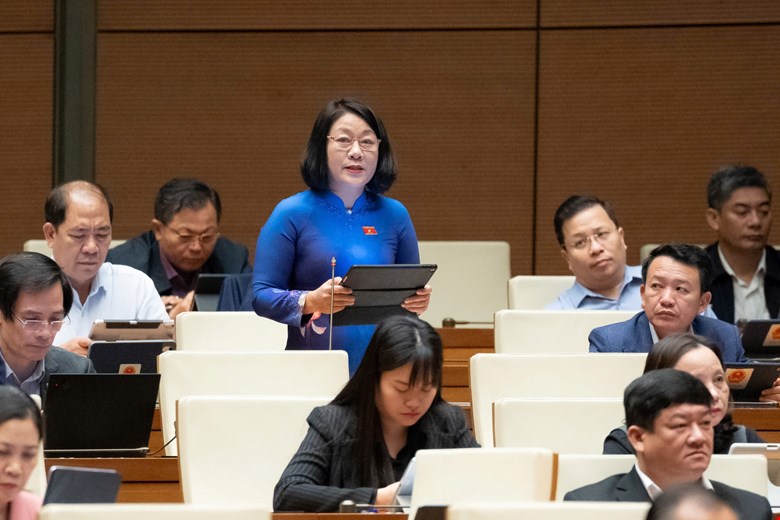On the morning of November 20, the National Assembly discussed the draft Resolution of the National Assembly on specific mechanisms and policies to implement Resolution No. 71-NQ/TW on breakthroughs in education and training development (ET).
Delegate Pham Hung Thang (Ninh Binh Delegation) said that Point a, Clause 2, Article 2 of the draft stipulates that vocational incentives are implemented for public preschools and general education institutions with a minimum of 70% for teachers, 30% for staff and 100% for teachers working in areas with particularly difficult socio-economic conditions, border areas, islands, and mountainous ethnic minority areas.
Through research and comparison with the draft resolution of the National Assembly on a number of breakthrough mechanisms and policies for the protection and care of people's health, Clause 3, Article 3 on policies, salaries and allowances for health workers stipulates that people who regularly and directly work in medical professional work at commune health stations and preventive medicine are entitled to a vocational allowance of 100% for ethnic minority areas, mountainous areas, areas with difficult socio-economic conditions, border areas, and islands; at least 70% for cases not in the above cases.
"The above regulation is very true to Resolution No. 72 of the Politburo, but I see a problem here, which is that people who regularly and directly work in healthcare at health stations are entitled to 100% preferential allowances for both areas with difficult socio-economic conditions and areas with special difficulties," he said.
Meanwhile, according to Resolution No. 71 of the Politburo and the draft resolution of the National Assembly on a number of specific and outstanding mechanisms and policies to implement the breakthrough in education and training development, only teachers working in areas with particularly difficult socio-economic conditions are entitled to 100% preferential allowances.
Teachers working in areas with difficult socio-economic conditions will not receive this preferential allowance, only receiving preferential allowances like areas with other socio-economic development conditions. The delegate said that such a provision is not commensurate, fair, and does not demonstrate superiority.
Therefore, the delegate suggested that the drafting agency study and consider expanding it to include public preschool and primary school teachers working in areas with difficult socio-economic conditions to receive a corresponding preferential allowance or if not 100%, it should be higher than 70% to avoid disadvantages for this group.

Delegate Nguyen Thi Tuyet Nga (Quang Tri Delegation) said that regarding investment incentives for education and training, the draft stipulates that the State guarantees a minimum of 20% for education.
According to the delegate, this regulation is not a breakthrough, with such a spending level, in the past the new education budget ensured that salary expenditure, investment expenditure for education was still low, and expenditure for educational activities was very low.
Therefore, the draft needs to clearly understand the financial mechanism, investment mechanism, and effective use of resources and cannot only rely on the state budget but must mobilize social resources and diversify social resources.











